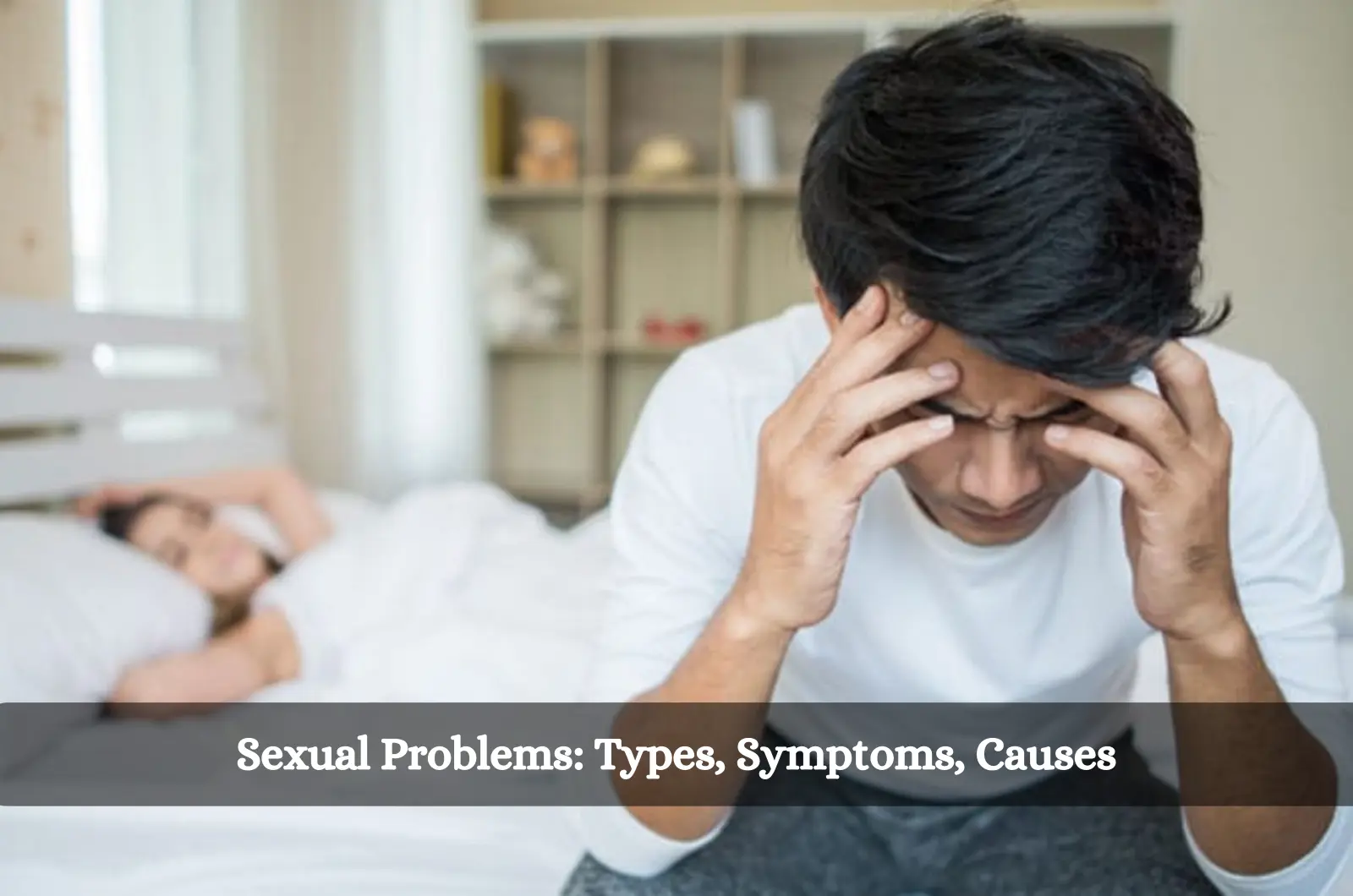Introduction
Sexual health is an essential element of general well-being, and problems in this area can be stressful and considerably influence one’s quality of life. Sexual issues can affect people of all ages, genders, and sexual orientations, and various circumstances can cause them. This article will look at the risk factors for sexual situations, considering physical, psychological, relationship, and lifestyle factors that can all contribute to these problems.
Understanding Sexual Problems
Definition
Sexual problems refer to a broad range of difficulties individuals may encounter related to their sexual function or satisfaction. These issues can manifest in different ways, such as low libido, erectile dysfunction, premature ejaculation, anorgasmia (inability to achieve orgasm), pain during intercourse, or a lack of sexual interest. Each concern may have unique risk factors, causes, and implications.
Prevalence and Impact
Sexual problems are more common than one might think, affecting people from diverse backgrounds worldwide. They can arise at any stage of life, and their prevalence may vary based on cultural, societal, and individual factors. These problems can significantly impact an individual’s self-esteem, confidence, and emotional well-being and strain intimate relationships.
Risk Factors for Sexual Problems
Several factors can increase the likelihood of experiencing sexual problems. Understanding these risk factors is crucial for addressing and managing sexual health issues effectively. The main risk factors can be categorized as follows:
Physical Factors
Age: Advancing age can lead to hormonal changes, decreased blood flow, and other physiological changes that may contribute to sexual problems.
Chronic Medical Conditions: Certain conditions like diabetes, heart disease, hormonal imbalances, and neurological disorders can impact sexual function.
Medications: Some medications, such as antidepressants, blood pressure medications, and antihistamines, may have side effects that affect sexual function.
Substance Abuse: Alcohol, tobacco, or recreational drugs can negatively influence sexual performance.
Psychological Factors
Stress and Anxiety: High stress and anxiety levels can lead to performance anxiety and hinder sexual function.
Depression: Individuals with depression may experience reduced interest in sexual activities.
Body Image Issues: Negative body image and low self-esteem can affect sexual confidence and satisfaction.
Relationship Factors
Communication Problems: Poor communication between partners can lead to misunderstandings and unmet sexual needs.
Intimacy and Emotional Connection: Lack of emotional connection and intimacy can impact sexual satisfaction.
Trust Issues: Trust is essential for vulnerability and openness in a sexual relationship.
Infidelity: The discovery or suspicion of an affair can lead to sexual problems.
Lifestyle Factors
Unhealthy Diet and Lack of Exercise: Poor lifestyle choices can contribute to overall health issues, affecting sexual function.
Lack of Sleep: Sleep deprivation can reduce libido and sexual energy.
Sedentary Lifestyle: Lack of physical activity can reduce blood flow and lower energy levels.
Age and Sexual Problems
Age-related factors can influence sexual problems. Different stages of life present unique challenges to sexual health:
Adolescence
During adolescence, individuals may experience anxiety and confusion about their changing bodies and sexual feelings. Peer pressure, lack of knowledge, and societal norms can also impact sexual experiences.
Adulthood
In adulthood, individuals may face stress from work, family responsibilities, and other life events, affecting their sexual desire and function. Maintaining open communication with a partner becomes crucial during this stage.

10 Tips to Help Prevent Sexual Problems
| Tips | Description |
|---|---|
| 1. Open Communication | Discuss desires, concerns, and boundaries with your partner to create a supportive and understanding environment. |
| 2. Practice Safe Sex | Use condoms or other barrier methods to protect against sexually transmitted infections (STIs) and unwanted pregnancies. |
| 3. Manage Stress | Reduce stress through relaxation techniques like meditation, exercise, or hobbies to improve sexual well-being. |
| 4. Healthy Lifestyle | Maintain a balanced diet, exercise regularly, avoid smoking, and limit alcohol intake to support sexual health. |
| 5. Regular Checkups | Attend routine medical checkups to address any underlying health issues that could impact your sexual function. |
| 6. Explore Foreplay | Engage in extended foreplay to enhance arousal and increase intimacy between partners. |
| 7. Learn about Sexual Health | Work with healthcare professionals to manage chronic conditions that may affect sexual function. |
| 8. Avoid Substance Abuse | Refrain from excessive use of drugs or alcohol, as they can hinder sexual performance and function. |
| 9. Manage Chronic Health Conditions | If sexual problems persist, consult a qualified therapist or sex counsellor for guidance and support. |
| 10. Seek Professional Help if Needed | If sexual problems persist, consult a qualified therapist or sex counselor for guidance and support. |

Medical Conditions and Sexual Problems
Menopause and andropause (male menopause) involve hormonal changes that can lead to shifts in sexual desire and function. It’s essential for individuals experiencing these stages to seek support and understanding from their partners.
Several medical conditions can contribute to sexual problems:
Diabetes
- Diabetes can damage nerves and blood vessels, leading to decreased sensitivity and blood flow to the genitals, affecting sexual function.
Heart Disease
- Heart disease can limit blood flow, potentially causing erectile dysfunction or reduced sexual stamina.
Hormonal Imbalances
- Hormonal imbalances, such as low testosterone in men or estrogen fluctuations in women, can impact sexual desire and function.
Neurological Disorders
- Conditions like multiple sclerosis or Parkinson’s disease can affect nerve signals, leading to sexual problems.

Mental Health and Sexual Problems
Mental health issues can profoundly influence sexual well-being:
Anxiety and Depression
- Anxiety and depression can reduce interest in sexual activities and hinder sexual performance.
Stress
- Chronic stress can affect hormone levels and contribute to sexual problems.
Body Image and Self-Esteem
- Negative body image and low self-esteem can lead to sexual insecurities and dissatisfaction.
Relationship Issues and Sexual Problems
- The dynamics of a relationship can significantly impact sexual health:
Communication Problems
- Poor communication can lead to misunderstandings and unaddressed sexual needs.
Intimacy and Emotional Connection
- Lack of emotional intimacy can affect sexual satisfaction and closeness between partners.
Trust Issues
- Trust is vital for fostering openness and vulnerability in a sexual relationship.
Infidelity
- The discovery or suspicion of infidelity can lead to sexual problems and emotional distress.
Substance Abuse and Sexual Problems
- The misuse of substances can negatively affect sexual function and satisfaction.
Prevention and Coping Strategies
- Addressing and managing sexual problems involves various strategies:
Seeking Professional Help
- Consulting a healthcare professional or therapist can provide valuable insights and support.
Improving Communication
- Open and honest communication with a partner is essential for addressing sexual concerns.
Maintaining Physical Health
- A healthy lifestyle, including regular exercise and a balanced diet, can positively impact sexual health.
Managing Stress and Mental Health
- Stress management techniques and seeking help for mental health issues can improve sexual well-being.
Exploring Therapies and Treatments
- Various therapies and treatments are available to address specific sexual problems, such as counseling, hormone therapy, or medication.
FAQ’s Risk Factors of Sexual Problems
Ques:- Can sexual problems be prevented?
Ans:- While not all sexual problems can be prevented, adopting a healthy lifestyle, managing stress, and maintaining open communication with a partner can reduce the risk of experiencing sexual difficulties.
Ques:- Is age a significant risk factor for sexual problems?
Ans:- Yes, age-related changes in hormone levels and physical health can increase the risk of sexual problems, but they can often be managed with appropriate care and support.
Ques:- Can mental health issues lead to sexual problems?
Ans:- Yes, mental health issues like anxiety and depression can negatively impact sexual desire and function, highlighting the importance of addressing mental and sexual well-being.
Ques:- How can couples address sexual problems in their relationship?
Ans:- Couples can address sexual problems by engaging in open and empathetic communication, seeking professional guidance if needed, and being supportive and understanding of each other’s needs.
Ques:- Is substance abuse linked to sexual problems?
Ans:- Yes, substance abuse can lead to sexual problems, affecting hormonal balance, nerve function, and overall physical health. Seeking help for substance abuse issues is essential for improving sexual well-being.
Ques:- How can I prevent sexual problems in my relationship?
Ans:- To prevent sexual problems in your relationship, open communication is crucial. Talk to your partner about your desires, concerns, and boundaries. Create a supportive and understanding environment where both partners feel comfortable expressing their needs. Safe sex with condoms or other barrier methods can protect against sexually transmitted infections (STIs) and unwanted pregnancies. Maintaining a healthy lifestyle, managing stress, and seeking regular medical checkups can further support sexual well-being.
Ques:- Can stress affect my sexual health?
Ans:- Yes, stress can significantly impact sexual health. High-stress levels can lead to decreased libido, difficulties with arousal, and even erectile dysfunction in men. Stress may affect hormone levels for both men and women, leading to sexual problems. Managing stress through relaxation techniques, such as meditation, exercise, or hobbies, is essential. Communicating with your partner about stress and finding ways to support each other can also improve sexual well-being.
Ques:- Are there lifestyle factors that can influence sexual function?
Ans:- Yes, various lifestyle factors can influence sexual function. Maintaining a healthy lifestyle, including a balanced diet, regular exercise, and adequate sleep, can positively impact sexual health. Avoiding substance abuse, such as excessive alcohol consumption and drug use, is also essential, as these can hinder sexual performance. Additionally, managing chronic health conditions, such as diabetes or heart disease, with the help of healthcare professionals can prevent potential sexual problems associated with these conditions.
Conclusion
Sexual problems are common issues that can arise due to various risk factors. Age, physical health, psychological well-being, and relationship dynamics all play a role in influencing sexual function and satisfaction. Understanding these factors and seeking appropriate support can help individuals address and manage sexual concerns, improving overall well-being and healthier relationships.




